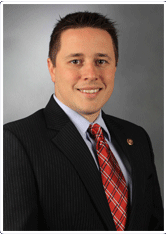In the realm of creating public policy, if a faction’s only response to a proposal is a consistent, resounding “no,” without offering some counter suggestion or expressing openness to a middle ground, they will eventually lose the debate, or be left out of it completely. Voters despise inaction by their elected officials, and justifiably so. Look at Congress’ approval ratings. Legislators are elected to find solutions. This is why it’s important that lawmakers continually seek ways to adapt and move forward on the biggest issues affecting the general public.
For the last three years, the General Assembly’s response to Medicaid Expansion has been “no,” but we’ve failed to discuss any other options. It’s explained the need for reform of the program—which it definitely needs, without a doubt—but it hasn’t put forth an alternative plan. It’s difficult to ask the public to be patient while we overhaul our largest social welfare system, especially when the speed of our progress is determining whether or not they can go to the doctor.
We have to start discussing other avenues of providing a hand up (not a handout) to Missourians who are employed, paying their taxes, playing by the rules, but still can’t afford coverage. This problem existed long before Obamacare, and it is not a partisan issue. Whether or not the Affordable Care Act was the appropriate response, and I contend it was not, is something we’ll likely be debating as a country for decades. Regardless, it is the only tool which we have to work with, at the moment.
A great deal of opposition to increasing eligibility has been a lack of public oversight attached to those extra Medicaid dollars. If we were to expand the system under existing requirements, or lack thereof, we’d be doing little more than writing the governor, and future administrations, a blank check to completely overhaul our states biggest social service program without the input of the people’s representatives.
However, there may be another way. The federal government has become increasingly open to offering waivers and Rep. Paul Ryan (R-WI) has proposed giving states block grants, or a lump sum of funding. States could then use those funds to expand Medicaid, but under the oversight of elected officials, in a way that best suits that state’s particular needs, and not at the direction of federal bureaucrats.
This week, I filed Senate Bill 419, which would create the Healthcare Transformation Trust Fund. Under the legislation, the Missouri Department of Social Services would seek approval to operate MO HealthNet under a Paul Ryan style block grant through the creation of the “Healthcare Transformation Trust Fund.” The fund would allow individuals making up to 138 percent of the federal poverty level to be eligible for Medicaid, closing the coverage gap that exists right now for many Missourians, including 50,000 veterans and their families. Just so you know, 138 percent of the federal poverty level is $16,243 for an individual, $21, 983 for a couple and $27,724 for a family of three. This is hardly a welfare giveaway to those who don’t need help.
The bill would also designate a joint committee of five senators and five representatives to promulgate rules to implement MO HealthNet and oversee its operation. This provision would ensure that the people’s representatives can control how these funds are being spent, and guarantee the program is run efficiently, effectively and in a fiscally sustainable way.
Most officials would agree there is an immediate problem in Missouri with a lack of healthcare access for citizens and families who fall into that coverage gap. They don’t qualify for Medicaid, but can’t receive subsidies to buy private insurance through the marketplace.
Those people, those families, need solutions. Senate Bill 419 is a possible one. The will of the Legislature will ultimately decide its fate, but it is imperative that we at least start having a conversation that leads to resolving this problem that is hurting our citizens. Let this legislation be the beginning of that long-overdue discussion.
As always, I am here to serve the 17th District. I welcome any discussion, questions or concerns regarding Missouri government. Please feel free to contact me at the State Capitol: (573) 751-5282, ryan.silvey@senate.mo.gov, or by writing to Sen. Ryan Silvey, Missouri State Capitol, 201 W. Capitol Ave., Room 331A, Jefferson City, MO 65101. |



